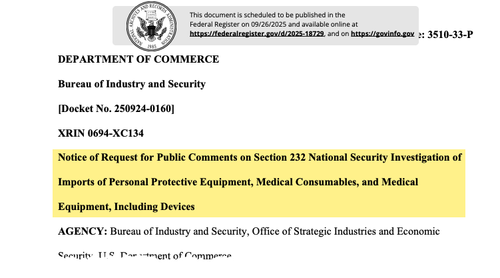U.S. Expands National Security Probe To Medical Devices, Equipment Amid Urgent Push To Reshore
At the start of the month, Trump administration officials initiated national security investigations into imports of personal protective equipment, medical consumables, and medical devices, including certain medical equipment. The US has long relied on foreign suppliers for a wide range of medical devices and equipment, and the Trump administration aims to reduce that dependence by reshoring many of these supply chains. If snarled supply chains during the Covid-era taught officials anything, it’s that producing medical supplies domestically will be crucial in the event of another pandemic or a major war.
On Wednesday, the Department of Commerce confirmed that it had initiated a national security investigation into “Imports of Personal Protective Equipment, Medical Consumables, and Medical Equipment, Including Devices” under Section 232 of the Trade Expansion Act on September 2. The filing was published in the Federal Register.
Here are the imported items focused on in the national security probe:
-
Medical consumables are single-use or short-term-use items like syringes, IV bags, catheters, bandages, and diagnostic reagents.
-
Pharmaceuticals are excluded from this probe, as they are being examined separately.
-
Medical equipment refers to durable tools and machines that support patient care, such as wheelchairs, crutches, and hospital beds.
-
Medical devices include instruments and machines for diagnosis, monitoring, and treatment—ranging from pacemakers and prosthetics to CT/MRI scanners, ventilators, and surgical apparatus.
The Department is seeking comments and information on the information below and how they relate to national security:
-
Current and projected US demand for PPE, medical consumables, and medical equipment (including devices).
-
Ability of domestic production to meet that demand.
-
Role of foreign supply chains, especially major exporters, in meeting US demand.
-
Risks from high concentration of imports from a few suppliers or nations.
-
Impact of foreign subsidies and predatory trade practices on US manufacturers.
-
Effects of artificially suppressed prices from unfair trade practices or state-backed overproduction.
-
Risk of foreign export restrictions or “weaponization” of supply control.
-
Feasibility of boosting domestic capacity to reduce reliance on imports.
-
Impact of current US trade policies, and whether additional measures (tariffs/quotas) are needed.
-
Risks of foreign control or exploitation of US supply chains.
-
Potential for foreign-built products to be weaponized.
-
Any other relevant factors affecting national security.
The probe has 270 days, from September 2, to deliver a report to the White House justifying sectoral tariffs on imported medical-related items aimed at boosting domestic production.
Meanwhile, national security probes into imports of pharmaceuticals, semiconductors, aircraft, rare earth minerals, medium- and heavy-duty trucks, and other products are still ongoing.
CEO of AdvaMed, the trade group that represents medical technology and device makers, informed CNBC that the MedTech supply chain is increasingly worried about poential medical tariffs that will only “drive up the cost of health care for patients, or on the health care system,” adding, “The reality is, any increased costs will be largely borne by taxpayer-funded health programs like Medicare, Medicaid and the [Veterans Health Administration.”
Rick Pollack, the CEO of the American Hospital Association, said in April that “disruptions in the availability of these critical devices — many of which are sourced internationally — have the potential to disrupt patient care.”
Tyler Durden
Thu, 09/25/2025 – 07:45ZeroHedge NewsRead More





 R1
R1
 T1
T1


